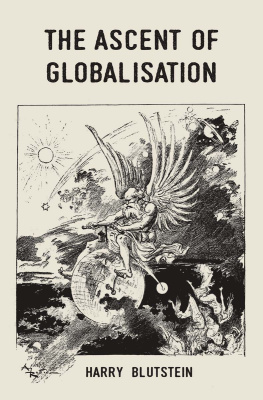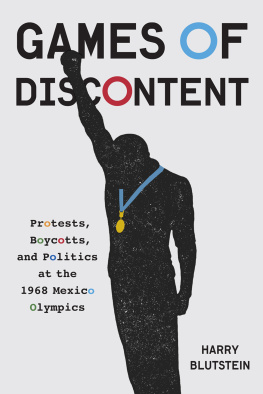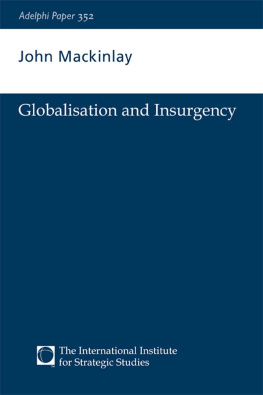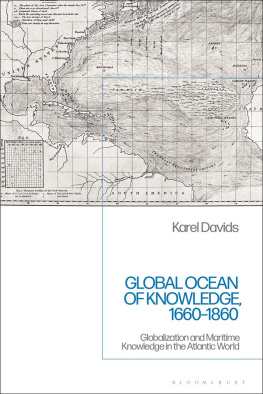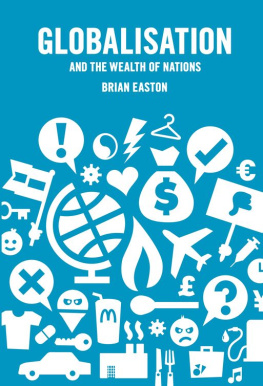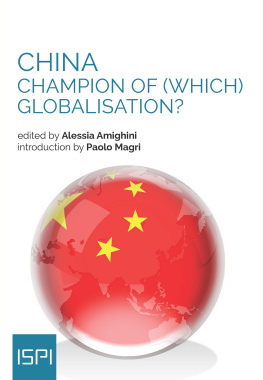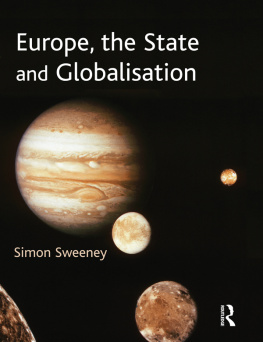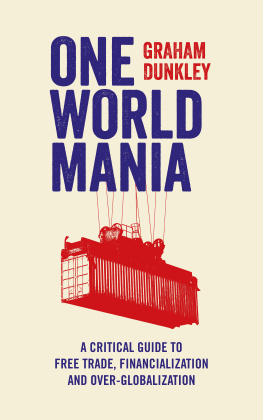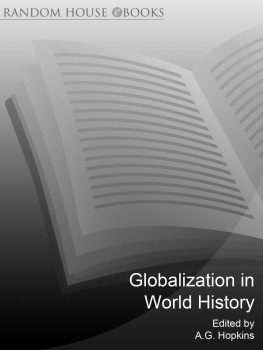The ascent of globalisation
The ascent of globalisation
HARRY BLUTSTEIN
Manchester University Press
Copyright Harry Blutstein 2016
The right of Harry Blutstein to be identified as the author of this work has been asserted by him in accordance with the Copyright, Designs and Patents Act 1988.
Published by Manchester University Press
Altrincham Street, Manchester M1 7JA
www.manchesteruniversitypress.co.uk
British Library Cataloguing-in-Publication Data
A catalogue record for this book is available from the British Library
Library of Congress Cataloging-in-Publication Data applied for
ISBN 978 1 7849 9289 7
First published 2016
The publisher has no responsibility for the persistence or accuracy of URLs for any external or thirdparty internet websites referred to in this book, and does not guarantee that any content on such websites is, or will remain, accurate or appropriate.
Typeset by
Servis Filmsetting Ltd, Stockport, Cheshire
Acknowledgements
I would like to particularly thank those many people who struggled through draft after draft of the manuscript. In particular, Jim Wilson who, over many a Yum Cha, provided constructive comments, as did Quynh-Nhu Nguyen, whose humour, patience and insights helped me improve the book, and she did so without the need to be fed. As well as commenting on the contents, Dave Mercer, Chris Burnup and Peter Ellyard often made me uncomfortable, as they challenged my arguments, and while were unlikely to ever agree on every issue, they helped me tighten sloppy arguments and seek out more evidence to back the major themes explored in this book. Many other people have been generous with their time and advice, among them Estevo Mabjaia, Harris Gleckman, Frank Penhalluriack, Nicole Krause, John Mooney, Patrick Longfield, Lawrence Molloy, Brian Gold, Lynn Murrell, Eric Walker, Fred Funnell (senior and junior), Greg Foyster, Rob Williams, Kate Richards, Di Websdale-Morrissey, Jesse Samulenok and the indomitable Bette Oldis, who sadly is no longer with us. Special thanks go to the RMIT Document Delivery team, in particular Marina Zovko, Tony Foley and Anna White, who went to extraordinary lengths to track down primary and obscure documents for me. Finally to my favourite wife, Carol Lawson, for her love, support and encouragement. This work simply would not have been possible without her.
Abbreviations
| BCSD | Business Council for Sustainable Development |
| BIT | bilateral investment treaty |
| CSR | corporate social responsibility |
| EU | European Union |
| FCTC | Framework Convention on Tobacco Control |
| GATS | General Agreement of Trade in Services |
| GATT | General Agreement on Tariffs and Trade |
| GAVI | Global Alliance for Vaccines and Immunization |
| ICC | International Chamber of Commerce |
| IEA | Institute of Economic Affairs |
| IIPA | International Intellectual Property Alliance |
| IMF | International Monetary Fund |
| IP | intellectual property |
| IPC | Intellectual Property Committee |
| ITO | International Trade Organization |
| LOTIS | Liberalisation of Trade in Services |
| MAI | Multilateral Agreement on Investment |
| MDG | Millennium Development Goals |
| NAFTA | North American Free Trade Agreement |
| NATO | North Atlantic Treaty Organization |
| NGO | non-governmental organization |
| OAS | Organization of American States |
| OECD | Organization for Economic Co-operation and Development |
| SEATO | South East Asia Treaty Organization |
| TPP | Trans-Pacific Partnership |
| TRIMS | Agreement on Trade-Related Investment Measures |
| TRIPS | Agreement on Trade-Related Aspects of Intellectual Property Rights |
| TTIP | Transatlantic Trade and Investment Partnership |
| UN | United Nations |
| UNDP | United Nations Development Programme |
| UNEP | United Nations Environment Programme |
| UNICE | Union of Industrial and Employers Confederations |
| UNICEF | United Nations Childrens Fund |
| WBCSD | World Business Council for Sustainable Development |
| WHO | World Health Organization |
| WSSD | World Summit on Sustainable Development |
| WTO | World Trade Organization |
Prologue
How distances become less and less; and this rapid approach, what is it but the commencement of fraternity? Thanks to railroads, Europe will soon be no larger than France was in the middle ages. Thanks to steam-ships, we now traverse the mighty ocean more easily than the Mediterranean was formerly crossed. Before long, men will traverse the earth, as the gods of Homer did the sky, in three paces! But yet a little time, and the electric wire of concord shall encircle the globe and embrace the world. (Victor Hugo, 1849)
In the publics imagination, globalisation might well have begun in 6 November 1872, when Jules Verne published the first instalment of Le Tour du monde en quatre-vingts jours, soon translated to Around the World in Eighty Days. It was first serialised in the popular newspaper, Le Temps, and then published as a book the following January.
This novel was a departure for Verne, who was best known for his science fic-tion; speculations on the impact of future technologies. For once he found that the present had caught up with his imagination, as he built his adventure story around the revolution in international transport and communications that was happening around him.
Vernes novel opens at the Reform Club in London, where, over a game of whist, six friends discuss an item in that days Morning Chronicle, which proclaimed the possibility of circumnavigating the world in eighty days. Challenging the scepticism of his companions, Phineas Fogg wagers 20,000 that he can complete the journey in that time.
With first-class tickets for Paris, he and his man-servant, Passepartout, set out on their adventures. Travelling by train, steamship, sledge-bearing sails and even an elephant, they overcome storms, kidnappings, natural disasters and Sioux attacks. As an added complication, Inspector Fix mistakes Fogg for a bank robber and begins to tail him. During the pursuit, Fix keeps Scotland Yard abreast of his progress through the telegraph system, which by the late nineteenth century linked three continents. While incidental to his story, Verne takes obvious pleasure showcasing the latest technologies, using their ability to compress both space and time to drive the action.
At the end of the book, Verne asks his hero, What had he gained from all this commotion? What had he got out of his journey?1 The answer: the hand of a pretty princess, whom Fogg saved from certain death in India. Had Verne put the same question to his readers, they would have undoubtedly confided that they had not only been handsomely entertained, but learned just how small the world had become as well.

